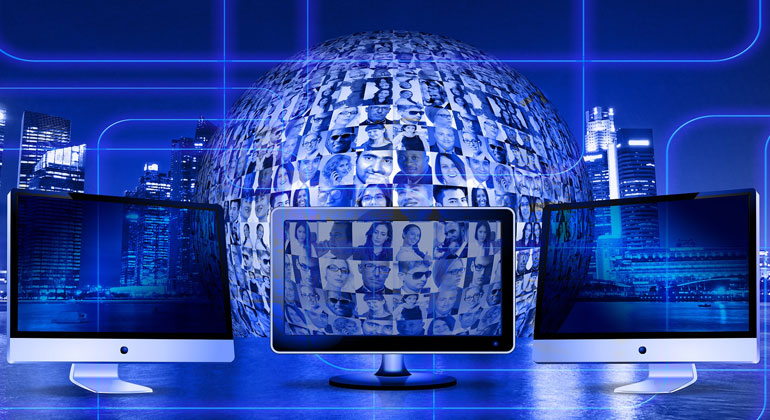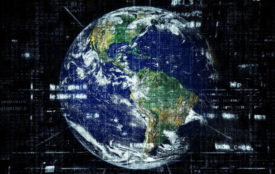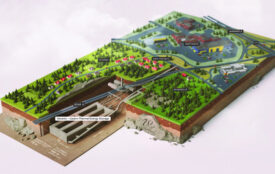Digital damage: Is your online life polluting the planet?
Shorter emails, camera-off Zoom calls and deleting old photos could reduce our digital carbon footprints – but sustainability expert Dr Jessica McLean says this is too big for individuals, and governments and organisations need to take responsibility.
Swapping digital meetings, shopping and even exercise classes for their in-person alternatives can substantially reduce greenhouse gas emissions by avoiding transport-related pollution, but the environmental impact of our digital lives is also surprisingly high, says Human Geographer Dr Jessica McLean.
“We don’t often think about the various infrastructures required to do simple things like send an email or hold our photos – these digital things are stored in data centres that are often out of sight, out of mind,” says McLean, who is a Senior Lecturer in Human Geography at Macquarie University’s School of Social Sciences.
“If we think about it at all, we usually expect these services to be continual and think that there isn’t really a limit on those digital practices,” she says.
However, digital activity has a surprisingly high environmental impact, says McLean, who has recently published a book on the topic.
Along with the greenhouse gas emissions from substantial energy use by our personal computers, data centres and communication equipment, this impact also includes the water use and land impact from mining, building and distributing the metals and other materials that make up our vast global digital infrastructure.
High-impact digital activities
Many researchers have attempted to calculate the individual carbon footprints of various technologies, and these often focus on the energy used by servers, home wi-fi and computers and even a tiny share of the carbon emitted to construct data centre buildings.
Some of our greenhouse-gassiest digital activities include:
- Video calls: Just one hour of videoconferencing can emit up to 1kg of CO2, require up to 12 litres of water and demand a land area adding up to approximately the size of an iPad Mini, according to recent research from MIT, Purdue and Yale University – but switch off the camera and you’ll save over 98 per cent of those emissions.
- Emails: Professor Mike Berners-Lee calculated that a short email sent phone-to-phone over wifi equates to 0.3 grams of CO2, a short email sent laptop-to-laptop emits 17g of CO2 and a long email with attachment sent from laptop could produce 50g of CO2.
- Digital hoarding: Data transfer and storage of thousands of photo, audio and video files, messages, emails and documents in an average US data centre emits around 0.2 tons of CO2 each year, for every 100 gigabyte of storage.
- Binge-watching in High Definition: Just one hour of HD streaming a day emits 160kg of CO2 each year – but swap to Standard Definition video quality and that drops to around 8kg of CO2 annually.
- Using super-computers: Australian astronomers each produce 15 kilotonnes of CO2 a year from super-computer work – more than their combined emissions from operating observatories, taking international flights and powering office buildings. However Dutch astronomers produce about 4 per cent of these emissions, as Netherlands national supercomputer uses 100 per cent renewable energy.
- Artificial Intelligence: Training a large AI model emits 315 times more carbon than a round-the-world flight.
Beyond the individual
Deconstructing the many and varied impacts of our increasingly digital lives can be overwhelming.
“There’s a lot to take in, and many of these figures will change depending on things like the use of renewable energy that is being taken up by some digital corporations and many individuals,” says McLean.
“This highlights the complexity of this challenge, showing that understanding and addressing digital sustainability goes beyond individual responsibilities, and is more fittingly held by governments and corporations.”
She says that the onus should be on governments to regulate a greater transparency on how digital corporations use energy, and to require regular reporting on sustainability targets.
Big tech continues to produce smartphones that are not designed to last.
“Most device manufacturers subscribe to a ‘planned obsolescence’ paradigm, rather than circular economy – for example, big tech continues to produce smartphones that are not designed to last.”
McLean’s recent research with Dr Sophia Maalsen (University of Sydney) and Dr Lisa Lake (UTS) found that while university students, staff and affiliates were concerned about the sustainability of digital technologies, there was a big gap between their intentions and actual practices of sustainability in their everyday digital lives.
“People expressed concern for the sustainability of their digital technologies, but they had limited opportunities to do anything substantive about this issue,” she says.
Digital ‘solutionism’ the wrong approach
Concepts like the paperless office, remote work and virtual conferences often come with a promise of lower environmental impacts – but McLean says these can be examples of ‘digital solutionism’.
“It’s time to question whether being digital is always the most sustainable solution,” she says.
McLean says that our society is becoming increasingly entangled in the digital via the exponential growth of intensely data driven activities and devices, from the Internet of Things to Big Data and AI.
However, she points out that this digital immersion isn’t universal.
“There are uneven patterns and gaps in these digital affordances, both within Australia and across the Global South,” she says.
Her book, Changing Digital Geographies, explores alternatives to our current exponential digital growth, and its impact on our natural world.
“There are many alternatives for how we live digitally, from making decisions about what’s ‘good enough’ to changing the whole digital lifecycle and the way it is regulated,” she says.
“Individuals cannot be expected to resolve these issues, governments need to regulate and corporations need to act, to improve our digital future and make it sustainable.”
Source
School of Social Sciences der Macquarie University 2022 | Dr Jessica McLean is a Senior Lecturer in Human Geography in the Macquarie School of Social Sciences.








